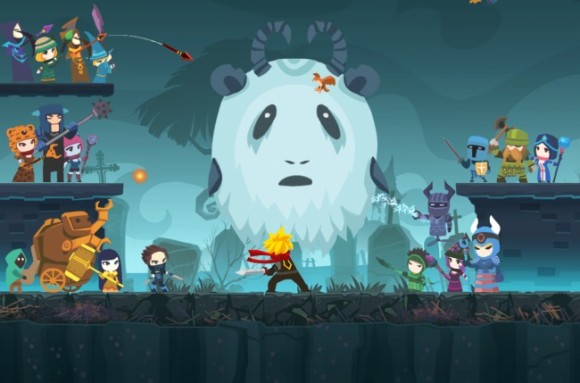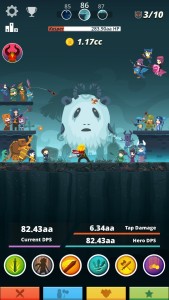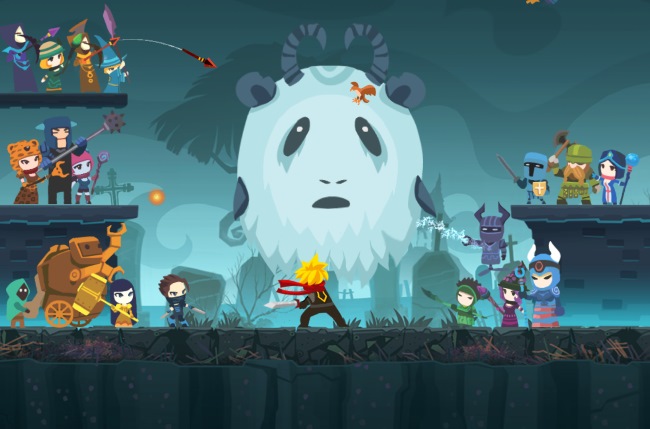
When I initially decided to write about Tap Titans I did so with the expectation that I would excoriate the game. In many ways I still want to. But after conducting a little research around the game, I have reservations concerning that impulse. Not because my opinions concerning the game have changed, but because I’m now more curious about where it sits in the wider context of gaming in 2015.
Let’s introduce our subject first. Tap Titans is a fantasy RPG of sorts, which I’m playing on an Android phone. The objective is to defeat enemies by tapping the screen, with each victory rewarding gold to be spent on upgrading your hero’s attack power and special abilities, or on recruiting NPCs for your army. 95% of the game is concerned with your DPS (damage per second, non-MMO folks). Your army provides a largely static DPS rate whereas the hero’s rate can be increased by tapping faster.
The remaining 5% of the game? Um… let’s go with activating special abilities, stats that affect how much gold you earn, occasionally resurrecting defeated NPCs, the premium currency / monetisation elements, and your internal monologue questioning why you’re bothering with all this.
You may be wondering if there is any sophistication to the character build systems, or whether there’s a trick to the tapping wherein your attacks are more effective. There isn’t. Your attacks can’t miss; you just tap anywhere on the screen that there isn’t another UI element. Your character builds are simply about getting the most DPS for your cash. The toughest decision you’ll have to make is whether it’s more advantageous to buy more levels at a lower cost on one hero, or fewer levels at a higher cost on another including a new skill (most of which, yes, apply a %age boost to your DPS).
Tap Titans is an almost entirely mindless game, albeit one that’s presented with visual flair and charm. Your NPC army will even keep earning you gold when you’re not playing. Obviously, given this, I was reminded of 2002’s Progress Quest.
Progress Quest was created to satirise the unengaging gameplay loops of the most popular MMO of the time, EverQuest. EverQuest had opted for a PvE (player vs. enemy) design, likely in response to the myriad PvP (player vs. player) problems experienced by Ultima Online – the most popular MMO before EverQuest appeared. Unfortunately for EverQuest players, this PvE structure meant that most of your time was spent killing the same creatures over and over again, every so often going up a level. Progress Quest mocked this formula by automating the entire process. Once the game is launched players are presented with a rudimentary and entirely cosmetic character creation screen, following which you essentially watch loading bars load and numbers grow larger.
I had thought that comparing an existent game released in 2014 to a parody application from 2002 would be a killing blow. Then I thought a little more, specifically about Cow Clicker.
Cow Clicker was created by game designer, writer & academic Ian Bogost in 2010 for the expressed purpose of satirising the Facebook games that had grown immensely popular over the preceding three years. Cow Clicker distilled Facebook games down to their most basic: players could click on a picture of a cow every six hours and earn a ‘Click’ for doing so. Astonishingly, or unsurprisingly, depending on your perspective concerning simple play, Cow Clicker became a genuine Facebook gaming phenomenon. Bogost has documented this including further links if you want to read more. It’s an excellent primer in the way that, when it comes to gaming, reality often outpaces satire.
Reading up on the influence of Progress Quest and Cow Clicker over the years since their creation, I began reading about the “idle games” phenomenon. This is outlined in a 2013 article on IGN by Justin Davis, Inside Cookie Clicker and the Idle Game Movement. The article’s focus is on Candy Box, A Dark Room and Cookie Clicker, all browser games which grew in popularity over 2013. I vaguely recall these games being widely played at the time, though I didn’t dabble in them myself as I was busy experiencing my career implode (plus I still remembered ‘playing’ Progress Quest a decade before). The article’s an interesting read as the games, like 2012’s gonzo hit Frog Fractions, are fond of subverting expectations by opening up new possibilities of play. They’re strange beasts, structurally revelling in playfulness and their lo-fi ability to shift between the expectations associated with certain game ‘genres’ even as they largely rely on the most cynical, compressed form of gameplay loops designed solely to compel players to keep going. You could see them as ironic game design, toying with contemporary expectations and then shooting off at a tangent; reading them as ironic also works because even their cynical investment loops defy expectations as there is no premium currency, and there are no mechanics whereby you annoy your friends on social media.
Meanwhile on Wikipedia, the term “incremental game” seems to have beaten out “idle game”. There’s also a list of incremental games on Reddit. I’m not familiar with more than a couple of games on that list but I suspect that, a popular phenomenon having been established, some of the games listed will be playful, ironic gags, whilst others will have been devised to sell advertising, or premium currency, or to otherwise generate some form of revenue. This is the unavoidable pattern of appropriation and commercialisation within late capitalism, so lets not pretend to be even slightly surprised.
In the context of this history of bizarre games which largely play themselves, in which player choice and agency is essentially reduced to when you intervene and how you choose to do so, and the now largely-established designed commercialisation of this loose genre of games, Tap Titans finds itself in an uneasy seat. I can’t deny that I’ve found it somewhat compelling; my prior writing on mobile games here on Arcadian Rhythms has probably made it fairly clear that I’m vulnerable to Skinner boxes. As I said before, Tap Titans is visually charming and everything about the game is smooth, slick and easy. Its premium currency is implemented non-obnoxiously, and there is absolutely no reason to invest beyond impatience to reach larger numbers faster.
 On the other hand Tap Titans isn’t funny, doesn’t surprise, doesn’t subvert or satirise anything, and does essentially exist to earn money in a cynical manner – from the tiny, tiny percentage of people who will pay to accelerate their acquisition of numbers, and through the showing of video ads to unlock temporary boosts or bonuses. Those ads, incidentally, are almost all for Game of War: Fire Age, the big budget Clash of Clans competitor which has adopted an Evony-style advertising campaign to attract players (thereby making it pretty much the final word in cynical, regressive bullshit). Advertising aside, Tap Titans doesn’t exhibit any of the memorable ways in which idle or incremental games have historically staked out popular acclaim: all it does is prettify that simple mechanic of investing your earnings to increase your earnings in a simple, inevitably climbing spiral.
On the other hand Tap Titans isn’t funny, doesn’t surprise, doesn’t subvert or satirise anything, and does essentially exist to earn money in a cynical manner – from the tiny, tiny percentage of people who will pay to accelerate their acquisition of numbers, and through the showing of video ads to unlock temporary boosts or bonuses. Those ads, incidentally, are almost all for Game of War: Fire Age, the big budget Clash of Clans competitor which has adopted an Evony-style advertising campaign to attract players (thereby making it pretty much the final word in cynical, regressive bullshit). Advertising aside, Tap Titans doesn’t exhibit any of the memorable ways in which idle or incremental games have historically staked out popular acclaim: all it does is prettify that simple mechanic of investing your earnings to increase your earnings in a simple, inevitably climbing spiral.
So what am I to make of it? I really don’t know. It’s an inoffensive example of a kind of game that at its best revels in the joy and possibility of games, and at its worst is a barely concealed machine to exploit human habits. Perhaps the best and worst thing that I can say about it is that it doesn’t need to exist.
…
I really need some better games for my phone. Oh, hey… Progress Quest is available on Android!

Comments
4 responses to “Tap Titans & incremental games: is it enough to simply exist?”
I'd say if someone is willing to 'play' Tap Titans, they should go for Progress Quest instead. You have no idea how glad I am to see it being on Android! I am tempted to get it, but I am curious to see if I can import my already-existing profile first. No use playing that awesome 'gem' if you can't import your level 80+ character that you've already had for YEARS on an old PII 266Mhz laptop!
[…] been a while since I wrote anything for you, my lovely Arcadians; almost a month in fact! In truth, I’ve been busy ordering parts for a new PC, preparing to go on holiday, […]
I played Tap Titans for approximately 2,5 minutes, so I’m not an expert on the subject, but I don’t get the appeal of this kind of games. I spent more time tapping the hell out of Malyneux’s Curiosity because I wanted to believe there’s a purpose to that. There wasn’t. Still, Tap Titans at least looks appealing. It looks like a game I would like to play if it was err, something different. I couldn’t say the same thing about the infamous All The Bravest, one of very few games I regret spending money on.
I don’t particularly get it either, but there’s clearly something there. This article is basically me trying, and failing, to connect with whatever that something might be.
Yeah, the visual styling is appealing, and that’s what sucked me in initially. That said a lot of unoriginal and uninspired mobile games have a cool aesthetic. It’s the one way of trying to express personality when the rest of your game is copy and pasted from somewhere else. (Not accusing TT of this; am thinking more of the numerous Evony/Clash of Clans rip offs we see everywhere these days.)